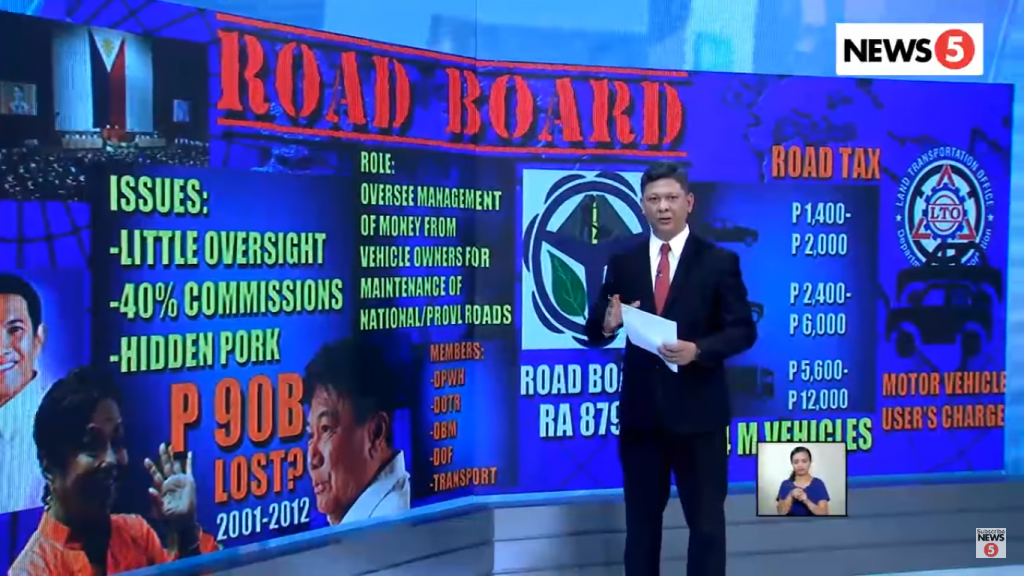Abolishing the Road Board: Corruption Crackdown Reveals Political Rift

THE ABOLITION of the Road Board, proposed by no less than President Rodrigo Duterte is not just about cracking down on corruption in the agency. It has also revealed a show of force among groups in the ruling coalition.
The Road Board made news in December,which was not the first time the agency has been placed in the media spotlight.As 2018 was ending, talk about its abolition began to stir officialdom and gained front page prominence after the president said he wanted it scrapped during a speech on December 20 made at the change of command ceremony of the Philippine Air Force.
Reports that followed recounted the allegations about the corruption in the agency, but seemed oblivious to the simmering division in the president’s political house.
CMFR monitored the leading broadsheets (Philippine Daily Inquirer, Manila Bulletin, The Philippine Star) and primetime newscasts (ABS-CBN 2’s TV Patrol, GMA-7’s 24 Oras, TV5’s Aksyon and CNN Philippines’ News Night) from December 17, 2018 to January 7, 2019.
Reporting Chain of Action
While media was following up on the spat between Budget Secretary Benjamin Diokno and legislators over budget insertions, the Inquirer on December 16 published a banner story on Rep. Pantaleon Alvarez (1st District, Davao del Norte) saying that the continuing row was all about control over the road user’s tax or the Motor Vehicle User’s Charge (MVUC) which the Road Board holds and which Alvarez claimed that House Speaker Gloria Macapagal-Arroyo’s allies wanted. Diokno had refused to release the funds on the orders of President Duterte. The Star and Bulletin, ran stories on this on their inside pages.
House Majority Leader Ronaldo Andaya Jr. (1st District, Camarines Sur) denied this was so. In a press briefing on December 19, Andaya stressed that the House is determined to scrap the Bill they crafted early in 2018to abolish the Road Board. Andaya said they spoke to the president who had given his consent to the distribution of its funds. He also said that president did not accept the resignation of Luisito “Chito” Clavano, executive director of the Road Board, to prove that the president concurred with retaining the agency. Media had not reported any of this background until revealed by Andaya in his briefing.
Clearly, President Duterte’s public statement forced the leadership of the House to act on his command. Media then reported on Andaya saying “We heard his message to the House. We will act based on his guidance” on December 23. Senate Majority Leader Juan Miguel Zubiri said in reports that the two chambers could now recall the enrolled copies of the bill abolishing the Road Board. By January 16, 2019, the House had approved on second reading the amended bill it crafted to abolish the Road Board.
Background and Context
Despite the significant responsibility residing in the agency, the Road Board had not really become a household word. CMFR takes positive note of media efforts to provide necessary background.
The Inquirer published “In the Know: Road Board” on December 18 discussing its role, composition and function. Aksyon ran an explainer on December 19. The Inquirer also published a “What went before” piece on December 20 which referred to irregularities involving MVUC which an inquiry by the Senate committees on economic affairs and public works revealed back in September 2009.
Established through Republic Act 8794 in 2000, the Road Board manages funds from MVUC which are meant for road maintenance and improvement, installation of adequate and efficient road safety devices and air pollution control. It is composed of secretaries of Public Works and Highways (DPWH), who sits as ex officio Chairman, the Transportation (DOTr), Budget and Management (DBM), and Finance (DOF) as ex officio members, and three representatives of private transport organizations.
The Commission on Audit (CoA) has consistently noted the mismanagement of MVUC funds. Its abolition had long been proposed because of corruption issues.
After President Duterte said in 2017 that he wanted to abolish it as part of his efforts to fight corruption in agencies and streamline services in government, both Houses in Congress began the legislative process needed.
Both chambers came up with bills to abolish the agency in 2018 – the Senate with Senate Bill 1620 in February and the House, then under the leadership of House Speaker Pantaleon Alvarez, with House Bill 7436 in May. As they differed in proposing the ways for the distribution of the road tax, committees had to reconcile the versions.
But in September, the House, after the take-over of Rep. Gloria Macapagal-Arroyo (2nd District, Pampanga), rescinded its approval of Bill 7436. Such background, although noted in the initial reports, did not refer to the event as yet another proof of Arroyo’s growing clout.
There is a scant reference to these details which are essential to the appreciation of this apparently divisive issue among key legislators in the January media coverage. No longer visible on primetime news during the monitored period, the reports on print have reverted to quoting statements of either the Palace or the House which was limited to what they were going to do next.
The Road Board holds a critical policy function, deciding on issues that affect road travel and transportation which are of wide public interest. The conduct of its business should be a matter of significant public concern. If it is abolished, what takes its place? And how does Duterte intend to prevent the corruption that marred the Road Board ?
The story is not over. Media must fix on all the
various aspects of the narrative moving forward. Clearly, the interest in
retaining it is fixed on the massive funds that pass through the Board. The public must be fully informed
about the pursuit of such interests; as people keep
track of the rifts shaking down the political alliance that supported Duterte’s
rise to the presidency.
Leave a Reply